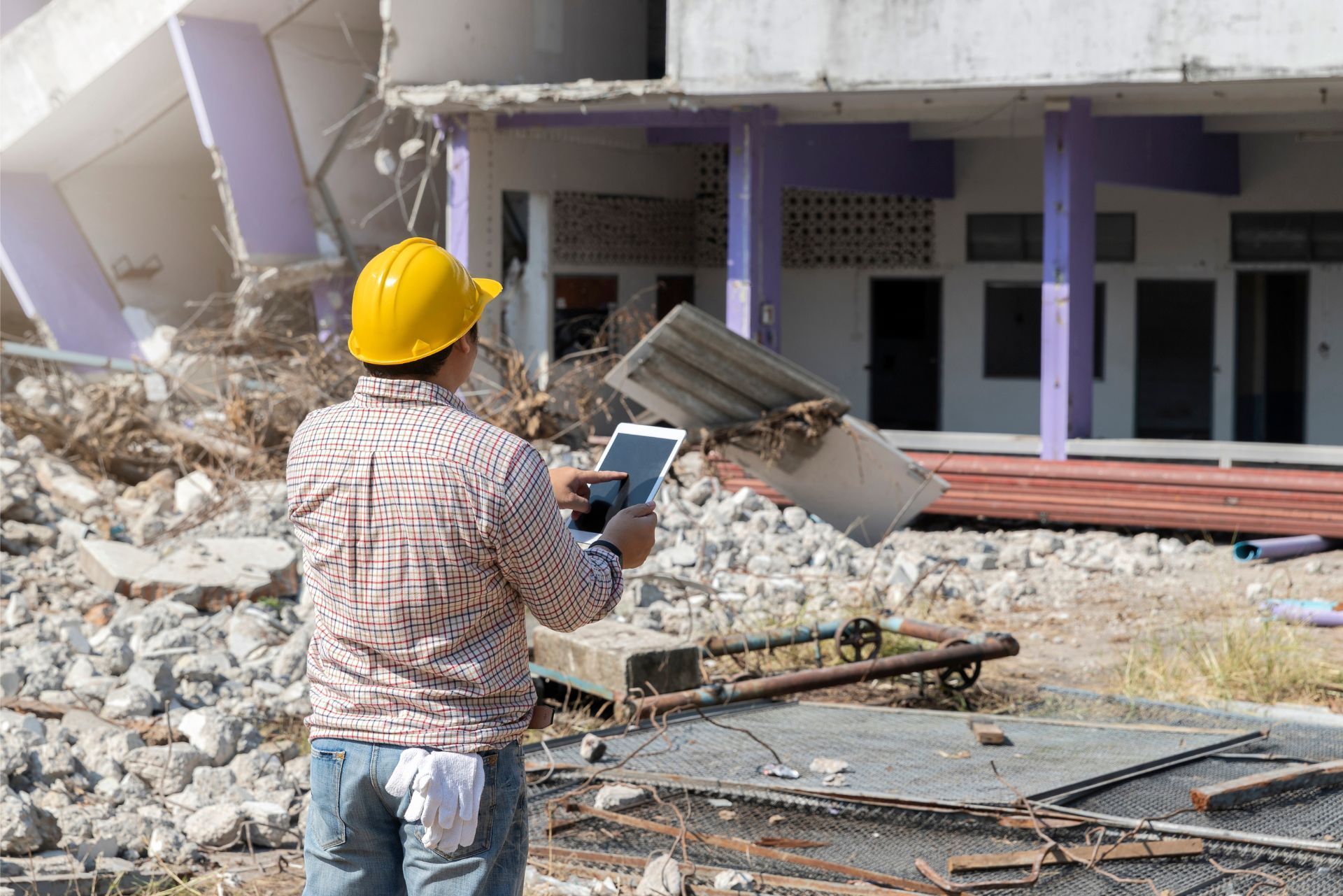South Carolina Demolition Contractor Insurance

9:00am - 5:00pm Mon-Fri
Will Reply in 15min*
Index
Understanding Demolition Contractor Insurance
Types of Insurance Coverage for Demolition Contractors
Legal Requirements for Demolition Contractors in South Carolina
Choosing the Right Insurance Provider
Cost of Demolition Contractor Insurance
How to File an Insurance Claim
Contact Us
Phone
864-626-6181
service@southerninsured.com
Location
5 Century Drive Suite 130 Greenville, SC 29607
810 Dutch Square Boulevard, Suite 123 Columbia, SC 29210
Demolition contractors play a crucial role in the
construction industry, tasked with safely tearing down structures to make way for new developments. However, this line of work comes with its own set of risks and challenges. To protect themselves and their businesses, demolition contractors in South Carolina must consider obtaining the right insurance coverage. This article delves into the essential aspects of
demolition contractor insurance, covering everything from types of coverage to legal requirements.
Understanding Demolition Contractor Insurance
Insurance for demolition contractors is designed to mitigate the various risks associated with demolition work. These risks can include property damage, bodily injury, and even environmental hazards. Understanding the different types of insurance available is crucial for contractors to ensure they are adequately protected.
What is Demolition Contractor Insurance?
Demolition contractor insurance encompasses a range of policies that provide coverage for businesses engaged in demolition activities. This insurance is tailored to address the unique risks faced by contractors in this field, including accidents on job sites, equipment damage, and liability claims.
By securing the right insurance, demolition contractors can protect their assets, employees, and clients from unforeseen events that may arise during the course of their work. Additionally, many insurance policies can include coverage for specialized equipment, such as excavators and bulldozers, which are essential for demolition tasks. This ensures that in the event of an accident or mechanical failure, the contractor can quickly resume operations without incurring substantial losses.
Why is Insurance Important for Demolition Contractors?
The demolition industry is inherently risky. Contractors often work with heavy machinery, deal with hazardous materials, and operate in unpredictable environments. Without proper insurance, a single accident could lead to significant financial losses, lawsuits, and even the closure of a business.
Insurance not only provides
financial protection but also enhances a contractor's credibility. Clients are more likely to hire a contractor who is insured, as it demonstrates professionalism and a commitment to safety. Furthermore, having comprehensive insurance coverage can also facilitate smoother interactions with regulatory bodies, as many jurisdictions require proof of insurance before granting permits for demolition projects. This compliance not only helps in avoiding legal complications but also reinforces the contractor's reputation as a responsible and trustworthy professional in the industry.

Types of Insurance Coverage for Demolition Contractors
Demolition contractors should consider various types of insurance coverage to ensure comprehensive protection. Here are some of the most common types of insurance that demolition contractors in South Carolina may need:
General Liability Insurance
General liability insurance is fundamental for any contractor. It covers third-party bodily injury and property damage claims that may arise during demolition work. For example, if a passerby is injured due to falling debris or if a neighboring property is accidentally damaged, general liability insurance can help cover legal fees and damages.
This type of insurance is crucial for protecting a contractor's financial interests and maintaining a positive reputation in the industry. Additionally, it can also cover advertising injuries, such as claims related to slander or copyright infringement, which can be particularly relevant for contractors who actively promote their services through various media.
Workers’ Compensation Insurance
Workers’ compensation insurance is mandatory in South Carolina for businesses with four or more employees. This insurance provides coverage for medical expenses and lost wages for employees who are injured on the job. Given the hazardous nature of demolition work, having workers’ compensation is essential for protecting both employees and the contractor.
In the event of an accident, this insurance ensures that workers receive the necessary care without placing a financial burden on the contractor. Furthermore, it can also help facilitate a smoother return-to-work process, offering rehabilitation services and support to injured workers, which can enhance morale and loyalty among the workforce.
Commercial Auto Insurance
Many demolition contractors use vehicles to transport equipment and personnel to job sites. Commercial auto insurance covers vehicles used for business purposes, protecting against accidents, theft, and damage. This insurance is particularly important for contractors who operate heavy machinery or specialized vehicles.
Having commercial auto insurance can also help protect a contractor's assets and reduce liability in case of an accident involving company vehicles. In addition, it often includes coverage for trailers and equipment that are towed, ensuring that all aspects of transportation are safeguarded. This can be especially beneficial in the demolition industry, where the transportation of large and expensive machinery is a routine part of daily operations.
While general liability, workers’ compensation, and commercial auto insurance are the core policies for demolition contractors, there are additional coverage options that may be beneficial:
Pollution Liability Insurance
Demolition work often involves hazardous materials, such as asbestos or lead. Pollution liability insurance provides coverage for claims related to environmental contamination caused by demolition activities. This insurance is crucial for contractors who may encounter hazardous materials during a project.
In the event of a pollution-related incident, this coverage can help cover cleanup costs and legal fees, protecting the contractor from significant financial loss. Additionally, many clients and municipalities now require contractors to carry pollution liability insurance as a prerequisite for bidding on projects, further emphasizing its importance in the industry.
Equipment Insurance
Demolition contractors rely on heavy machinery and specialized equipment to perform their work. Equipment insurance covers the repair or replacement of damaged or stolen equipment. This type of insurance is essential for minimizing downtime and ensuring that operations can continue smoothly.
Investing in equipment insurance can save contractors from substantial out-of-pocket expenses if equipment is damaged during a project. Moreover, some policies may also cover rental equipment, which can be a significant advantage if a contractor needs to temporarily replace a piece of machinery while repairs are being made. This flexibility can help maintain project timelines and client satisfaction.
Builder’s Risk Insurance
Builder’s risk insurance provides coverage for buildings under construction or renovation. This insurance protects against damages caused by fire, theft, or vandalism during the demolition and rebuilding process. For contractors involved in projects that include both demolition and new construction, builder’s risk insurance is a valuable addition to their insurance portfolio.
This type of insurance typically covers not just the structure itself, but also materials and supplies on-site, ensuring that all aspects of the project are safeguarded. Furthermore, builder’s risk insurance can often be tailored to the specific needs of a project, allowing contractors to adjust coverage limits and terms based on the unique risks associated with each job. This adaptability can be crucial in managing costs while still providing comprehensive protection against unforeseen events that could disrupt construction timelines and budgets.
Legal Requirements for Demolition Contractors in South Carolina
In South Carolina, demolition contractors must adhere to specific legal requirements regarding insurance. Understanding these regulations is vital for compliance and to avoid potential legal issues.
State Licensing Requirements
Before operating as a demolition contractor in South Carolina, individuals or businesses must obtain the appropriate licenses. The South Carolina Department of Labor, Licensing and Regulation oversees the licensing process. Contractors must demonstrate their qualifications and experience in the field to obtain a demolition license.
Having the necessary licenses not only ensures compliance with state regulations but also enhances a contractor's credibility in the industry. Furthermore, the licensing process often involves passing examinations that assess knowledge of safety protocols, environmental regulations, and industry best practices. This requirement helps to ensure that licensed contractors are equipped to handle the complexities of demolition projects safely and efficiently.
Insurance Requirements
While South Carolina does not have a specific law mandating demolition contractors to carry insurance, it is highly recommended. Many clients and municipalities require proof of insurance before awarding contracts. Additionally, having insurance can protect contractors from liability and financial loss.
Contractors should consult with an insurance agent familiar with the construction industry to determine the appropriate coverage levels and types of insurance needed for their specific operations. Common types of insurance that demolition contractors may consider include general liability insurance, workers' compensation insurance, and environmental liability insurance, which can cover damages related to hazardous materials. By securing comprehensive insurance coverage, contractors not only safeguard their business but also instill confidence in clients, demonstrating a commitment to responsible and professional practices in the demolition industry.

Choosing the Right Insurance Provider
Selecting the right insurance provider is a critical step for demolition contractors. Here are some factors to consider when choosing an insurance company:
Experience in the Construction Industry
It is essential to choose an insurance provider with experience in the construction and demolition sectors. An insurer familiar with the unique risks and challenges of the industry will be better equipped to offer tailored coverage options.
Look for providers that specialize in construction insurance and have a proven track record of serving demolition contractors. These companies often understand the nuances of various demolition projects, including environmental regulations, safety standards, and the potential for property damage, which can significantly influence policy terms and premiums.
Coverage Options and Flexibility
Different contractors have varying needs based on the size of their business, the types of projects they undertake, and their risk exposure. An ideal insurance provider should offer a range of coverage options and the flexibility to customize policies to meet specific needs.
Contractors should discuss their unique requirements with potential insurers to ensure they receive adequate protection. For instance, some projects may require additional coverage for equipment or subcontractors, while others might need specialized liability coverage for hazardous materials. Understanding these specific needs can help contractors avoid gaps in their coverage that could lead to significant financial losses.
Customer Service and Claims Process
Excellent customer service is crucial when dealing with insurance providers. Contractors should look for insurers that are responsive and supportive, especially during the claims process. A smooth and efficient claims process can make a significant difference in the aftermath of an incident.
Reading reviews and testimonials from other contractors can provide insights into the level of service offered by different insurance providers. Additionally, it can be beneficial to inquire about the insurer's claims history, including average turnaround times for claims resolution and the availability of dedicated claims representatives. A provider that prioritizes its clients' needs and offers proactive support can be invaluable, particularly in high-stress situations where timely assistance is essential for business continuity.
Cost of Demolition Contractor Insurance
The cost of demolition contractor insurance can vary significantly based on several factors. Understanding these factors can help contractors budget for their insurance needs effectively.
Factors Affecting Insurance Premiums
Several factors influence the cost of insurance premiums for demolition contractors, including:
- Business Size: Larger businesses with more employees and equipment may face higher premiums due to increased risk exposure.
- Type of Work: The nature of the demolition work being performed can impact costs. High-risk projects may lead to higher premiums.
- Claims History: Contractors with a history of frequent claims may face higher premiums compared to those with a clean record.
- Coverage Limits: The level of coverage selected will also affect premiums. Higher coverage limits typically result in higher costs.
Average Costs
While it is challenging to provide a one-size-fits-all estimate, demolition contractor insurance can range from a few hundred to several thousand dollars annually. On average, small to medium-sized contractors may expect to pay between $1,000 and $3,000 per year for general liability insurance.
For more comprehensive coverage, including workers’ compensation and additional policies, costs can increase significantly. It is advisable for contractors to obtain quotes from multiple providers to compare costs and coverage options.
Moreover, the geographical location of the business can also play a crucial role in determining insurance costs. For instance, contractors operating in urban areas may encounter higher premiums due to the increased likelihood of accidents and the density of nearby structures. Additionally, local regulations and state laws regarding construction and demolition can influence the type of coverage required, further affecting overall costs.
Contractors should also consider the benefits of risk management practices, as implementing safety protocols and training can potentially lower insurance premiums. Insurers often reward businesses that demonstrate a commitment to safety with reduced rates, making it essential for contractors to prioritize risk mitigation strategies in their operations. This proactive approach not only enhances safety on job sites but can also lead to significant savings on insurance costs over time.
How to File an Insurance Claim
In the event of an incident, knowing how to file an insurance claim is essential for demolition contractors. The claims process can vary by provider, but here are general steps to follow:
Document the Incident
Immediately after an incident occurs, it is crucial to document the situation thoroughly. Take photographs, gather witness statements, and collect any relevant information that may support the claim. This documentation will be vital when filing the claim.
Notify the Insurance Provider
Contact the insurance provider as soon as possible to report the incident. Most insurers have a specific timeline for reporting claims, so prompt notification is important. Provide the insurer with all necessary details and documentation related to the incident.
Follow Up and Cooperate
After filing the claim, stay in contact with the insurance provider to monitor the progress. Be prepared to provide additional information or documentation if requested. Cooperation during the claims process can help expedite resolution.
Tips for Reducing Insurance Costs
While insurance is essential for demolition contractors, there are strategies to help reduce costs without sacrificing coverage:
Implement Safety Measures
Investing in safety training and equipment can significantly reduce the likelihood of accidents and claims. Insurance providers often offer discounts for contractors with strong safety records and comprehensive safety programs in place.
Bundle Policies
Many insurance providers offer discounts for bundling multiple policies. Contractors can save money by purchasing general liability, workers’ compensation, and commercial auto insurance from the same provider.
Regularly Review Coverage
As a business grows and evolves, so do its insurance needs. Regularly reviewing coverage levels and policies can help ensure that contractors are not overpaying for unnecessary coverage or missing out on potential savings.
Conclusion
In the demolition industry, having the right insurance coverage is not just a legal requirement; it is a vital component of running a successful and sustainable business. South Carolina demolition contractors must navigate various risks, and insurance provides a safety net against potential financial losses.
By understanding the different types of insurance available, legal requirements, and how to choose the right provider, contractors can make informed decisions that protect their businesses and employees. Additionally, implementing safety measures and regularly reviewing coverage can help reduce costs while maintaining essential protection.
In an industry where safety and reliability are paramount, investing in comprehensive insurance coverage is a step towards ensuring long-term success and peace of mind.






